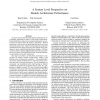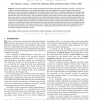111
click to vote
ISCAPDCS
2001
15 years 3 months ago
2001
The implementation of modern high performance computer is increasingly directed toward parallelism in the hardware. However, most of the current fetch units are limited to one bra...
124
click to vote
MICRO
1995
IEEE
15 years 5 months ago
1995
IEEE
Accurate instruction fetch and branch prediction is increasingly important on today’s wide-issue architectures. Fetch prediction is the process of determining the next instructi...
161
click to vote
ASSETS
2006
ACM
15 years 5 months ago
2006
ACM
Finding lost items is a common problem for the visually impaired and is something that computing technology can help alleviate. In this paper, we present the design and evaluation...
119
click to vote
DATE
2004
IEEE
15 years 5 months ago
2004
IEEE
This paper proposes a low-energy solution for CAMbased highly associative I-caches using a segmented wordline and a predictor-based instruction fetch mechanism. Not all instructio...
119
click to vote
ASPDAC
2004
ACM
15 years 5 months ago
2004
ACM
Abstract-- The power consumption of microprocessors has been increasing in step with the complexity of each progressive generation. In general purpose processors, this is primarily...
130
Voted
ICS
1999
Tsinghua U.
15 years 6 months ago
1999
Tsinghua U.
—This paper explores the use of compiler optimizations which optimize the layout of instructions in memory. The target is to enable the code to make better use of the underlying ...
112
click to vote
ICPP
2002
IEEE
15 years 7 months ago
2002
IEEE
Conventional instruction fetch mechanisms fetch contiguous blocks of instructions in each cycle. They are difficult to scale since taken branches make it hard to increase the siz...
105
click to vote
ISLPED
2005
ACM
15 years 7 months ago
2005
ACM
1 A highly-efficient fetch unit is essential not only to obtain good performance but also to achieve energy efficiency. However, existing designs are inflexible and depending on pr...
104
click to vote
APCSAC
2005
IEEE
15 years 7 months ago
2005
IEEE
Continuing advances in semiconductor technology and demand for higher performance will lead to more powerful, superpipelined and wider issue processors. Instruction caches in such ...
111
click to vote
ISCA
2008
IEEE
15 years 8 months ago
2008
IEEE
Architectures that exploit control independence (CI) promise to remove in-order fetch bottlenecks, like branch mispredicts, instruction-cache misses and fetch unit stalls, from th...






